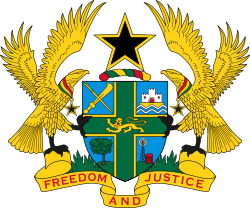29 August 1969 | ||||||||||||||||||||||
All 140 seats in the National Assembly 71 seats needed for a majority | ||||||||||||||||||||||
|---|---|---|---|---|---|---|---|---|---|---|---|---|---|---|---|---|---|---|---|---|---|---|
| ||||||||||||||||||||||
 |
|---|
| Constitution |
| |
Parliamentary elections were held in Ghana on 29 August 1969, the first since the 1966 coup by the National Liberation Council which toppled the Nkrumah government.
Contents
Voters elected the new 140-seat Parliament. Kofi Abrefa Busia, the leader of the Progress Party (which won 105 of the 140 seats) [1] became Prime Minister. [2] There were no presidential elections, as the system adopted was a parliamentary republic. Instead, a ceremonial president, Edward Akufo-Addo, was elected by an electoral college.

